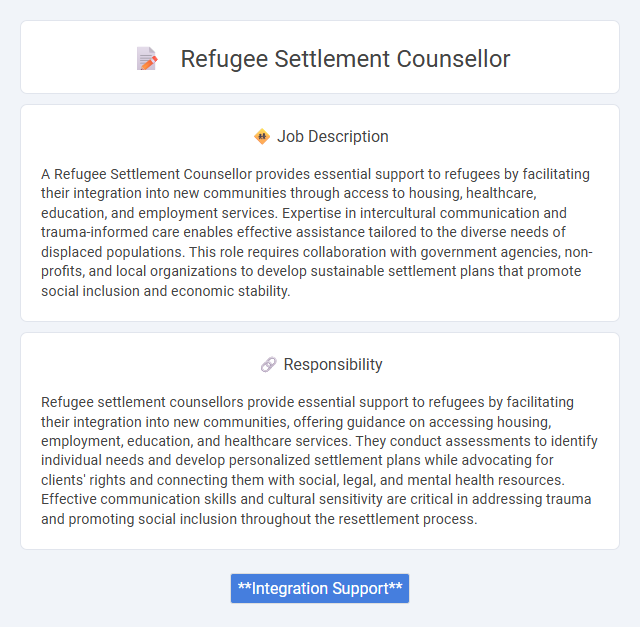
A Refugee Settlement Counsellor provides essential support to refugees by facilitating their integration into new communities through access to housing, healthcare, education, and employment services. Expertise in intercultural communication and trauma-informed care enables effective assistance tailored to the diverse needs of displaced populations. This role requires collaboration with government agencies, non-profits, and local organizations to develop sustainable settlement plans that promote social inclusion and economic stability.
Refugee settlement counsellors likely work with individuals facing significant trauma, cultural adjustment challenges, and legal uncertainties, requiring high empathy and resilience. Candidates who possess strong communication skills, cultural sensitivity, and the ability to manage stressful situations are probably well-suited for this role. Those lacking emotional stamina or patience might find it difficult to succeed in this demanding environment.
Qualification
A Refugee Settlement Counsellor must possess a bachelor's degree in social work, psychology, or a related field, with preference for candidates holding a master's degree or specialized certifications in trauma-informed care or cross-cultural counselling. Proficiency in multiple languages and experience working with diverse refugee populations enhance the ability to provide tailored support and facilitate successful integration. Strong interpersonal skills, crisis intervention training, and knowledge of local immigration laws are essential qualifications for effective service delivery.
Responsibility
Refugee settlement counsellors provide essential support to refugees by facilitating their integration into new communities, offering guidance on accessing housing, employment, education, and healthcare services. They conduct assessments to identify individual needs and develop personalized settlement plans while advocating for clients' rights and connecting them with social, legal, and mental health resources. Effective communication skills and cultural sensitivity are critical in addressing trauma and promoting social inclusion throughout the resettlement process.
Benefit
Refugee settlement counsellors likely provide critical support that enhances newcomers' integration into society, improving access to essential services such as housing, education, and healthcare. Their guidance probably increases the chances of refugees successfully adapting to new environments, reducing social isolation and promoting mental well-being. This role may also contribute to fostering community cohesion and long-term self-sufficiency among refugee populations.
Challenge
Refugee settlement counsellors likely face challenges related to navigating complex legal systems and addressing diverse cultural backgrounds, which may complicate communication and trust-building. The probability of encountering clients with trauma and mental health issues can require specialized skills and adaptability in providing effective support. Limited resources and fluctuating policy environments might also restrict the scope of assistance available, demanding creative problem-solving from counsellors.
Career Advancement
Refugee settlement counsellors gain valuable experience in cross-cultural communication, crisis intervention, and social services coordination, building a strong foundation for career advancement in social work or humanitarian fields. Opportunities for growth include supervisory roles, specialized positions in mental health support, or policy advocacy within governmental and non-governmental organizations. Advanced degrees and certifications in counselling, social work, or international development further enhance prospects for leadership positions and increased impact on refugee integration programs.
Key Terms
Integration Support
Refugee settlement counsellors provide crucial integration support by assisting newcomers in navigating housing, employment, education, and healthcare systems. They develop personalized plans to address cultural adjustment challenges and facilitate access to community resources. This role enhances social inclusion and promotes long-term stability for refugees adapting to their new environment.
 kuljobs.com
kuljobs.com